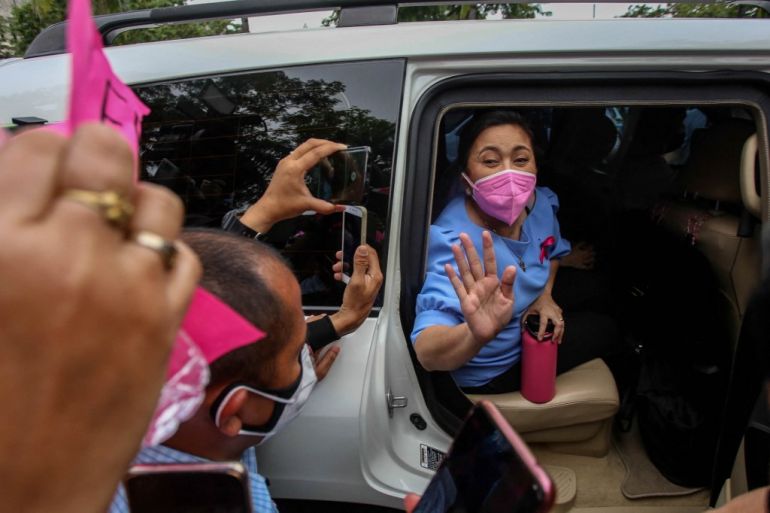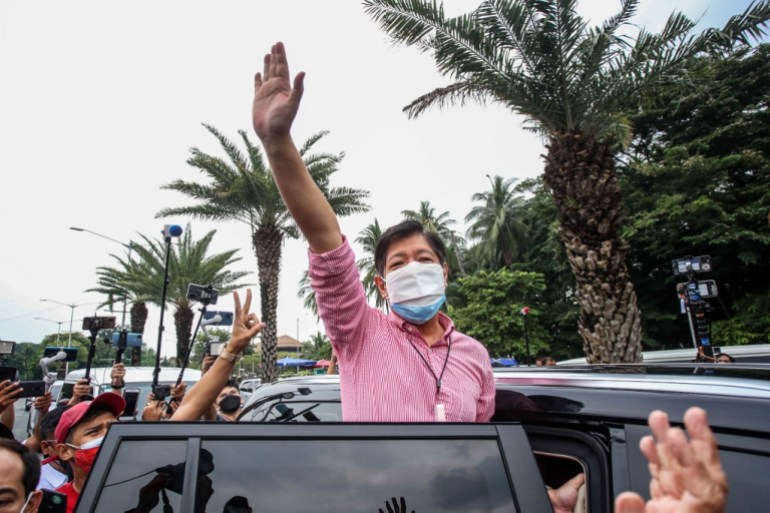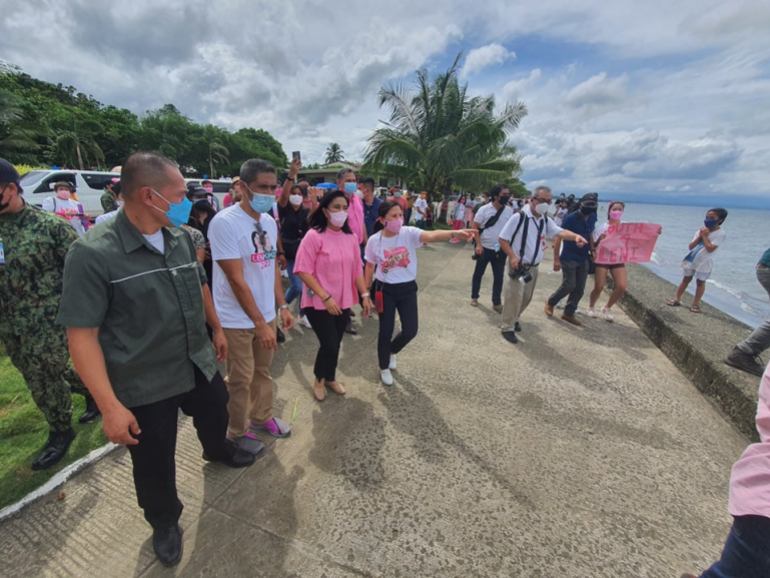COVID tames race to replace Duterte as Philippine president
Community lockdowns, curbs on mass gatherings present unprecedented challenge as campaigning starts for May 9 election.

Zamboanga del Norte, Philippines – Wading through a crowd of supporters, Vice President Leni Robredo moved carefully as a group of teens started to gather around her, hoisting their phone cameras, ready to take selfies. The presidential candidate obliged her mask-wearing fans as her staff repeatedly reminded the growing crowd to keep their distance because of COVID-19 restrictions.
Other supporters stood by, waving hand-made posters and rose-coloured banners with Robredo’s image, shouting her name in unison. Their voices were drowned out by the booming live music playing for a dance troupe that was swaying and twirling in native costume as it welcomed the Philippines’ highest-ranking female official.
Keep reading
list of 3 itemsPhilippines dismisses bid to bar Marcos Jr from presidential race
What is behind the resurgence of the Marcos dynasty?
In a typical election year, when candidates woo voters at events up and down the country of 7,107 islands, Robredo’s Mardi Gras-style reception would have been considered tame. But during a pandemic, when community lockdowns and rigid limits on mass gatherings are the new normal, organisers say the turnout exceeded their expectations.
As the campaign season officially kicks off on Tuesday, Robredo and the other candidates have been forced to adjust to an electoral landscape turned upside-down by COVID-19.
Since the 1986 People Power protests and the restoration of democracy, elections for president and vice president have taken place every six years, with Filipinos also voting for 12 senators, more than 300 House members and about 18,000 local positions – from governors to town council members – in a circus-like political jamboree that lasts three months.
Trailing in the polls, Robredo is seeking to whip up her supporters and pull off another come-from-behind victory on May 9 as she did in 2016 when she was elected vice president.
Standing against her – and currently, the most popular candidate to replace President Rodrigo Duterte – is Ferdinand Marcos Jr, son and namesake of former dictator Ferdinand Marcos Sr, whose brutal rule was brought to an end by the 1986 protests.
After six years of strongman rule under Duterte, who is barred from running for president a second time, the stakes could not be higher.
“If Bongbong Marcos wins, it affirms that Duterte’s victory is not just a blip in post-Marcos political history,” said Robin Michael Garcia, head of WR Numero, a technology-driven polling and data analytics firm based in Manila, using Marcos Jr’s nickname.
“We know that Duterte already has authoritarian tendencies, and I do not think Bongbong will be any better than Duterte in political governance,” Garcia told Al Jazeera.
There are an estimated 65.74 million registered voters in the country. A presidential candidate only needs a plurality – winning more votes than any other candidate – to win.
‘High economic stake’
With an economy clobbered by the coronavirus, “the future of the county is at stake”, Hezekiah Concepcion, a social science professor at the Ateneo de Zamboanga University, told Al Jazeera.
“The new president must be able to lead in the recovery of the economy battered by the pandemic, which according to experts, cost our country around 40 trillion pesos ($776.6bn),” over the next four decades, he said.
There are 65.74 million registered voters for the 2022 elections, according to the Commission on Elections. #BilangPilipino2022 pic.twitter.com/8GcmYTHPnX
— ONE News PH (@onenewsph) December 20, 2021
According to a report citing the International Labor Organization (ILO), unemployment is also projected at 1.1 million this year, which is 10 percent higher than pre-pandemic levels. In November, the Philippine Statistics Authority estimated the number of unemployed at 3.16 million.
Concepcion says that, given the situation, the next president needs to be “inspirational” to unite the country and “smart in choosing experts and technocrats” to address the economy, education, health and pandemic-related concerns.
But instead of focusing on the economy and the pandemic, many of the candidates have been engaging in backroom deals and political jockeying for months as they seek to succeed Duterte. Duterte himself had filed to run for senator but later dropped out.
Marcos and Duterte-Carpio tandem
Analysts say Duterte’s political machinery has mobilised behind Marcos Jr even though Duterte himself has referred to Marcos Jr as a “weak leader”.
His daughter, Davao Mayor Sara Duterte-Carpio, appears to think otherwise. She has declared her support for Marcos Jr and agreed to run as his vice president, thereby consolidating their support into a formidable base. She too had considered running for president at one point.
Even before he declared his presidential bid in October, Marcos Jr had leveraged his 4.4 million Facebook followers to spread his message and woo voters through “virtual campaign caravans” and online “meet-and-greet” events.
His campaign also posts slickly produced daily vlogs and hosts occasional Facebook Live chats to compensate for the limited in-person rallies. In one of his videos, however, Marcos Jr says he still prefers “old-school” campaigning, where he can see his supporters and shake their hands.
Garcia, of polling firm WR Numero, describes Marcos Jr’s pre-election polling as “unprecedented”.
“If none of the other candidates does anything drastic in the next three months, Bongbong Marcos will be our next president,” he told Al Jazeera.
It does not hurt the Marcos and Duterte-Carpio team that Duterte remains highly popular despite the economic recession and pandemic and the International Criminal Court (ICC) investigation into his signature “war on drugs” for the possible “crime against humanity of murder”.

Marcos’ toughest challenger
As vice president, Robredo is considered the Philippines’ leading opposition figure and Marcos Jr’s toughest challenger.
Robredo and Duterte were sworn into office in 2016, but they disagree on many issues, including the handling of the pandemic response and the war on drugs, which she labelled a failure.
Presidents and vice presidents are elected separately in the Philippines, frequently resulting in the election of candidates from rival parties, like Duterte and Robredo, who are then unable to work together.
In becoming vice president in 2016, Robredo defeated Marcos Jr, who went on to challenge her victory in court. While the effort failed, his supporters mounted a sustained social media campaign questioning the legitimacy of Robredo’s win, weighing on her popularity. Recent polls show her behind Marcos Jr by a wide margin, although her ratings are inching up again.
Robredo has attempted to rally the support of other opposition figures in a bid to eat into Marcos Jr’s lead, but with little success so far.
Presidential candidates include international boxing champion Manny Pacquiao, Manila Mayor Isko Moreno and Senator Panfilo Lacson.
When it comes to experience and record, however, no candidate comes close to Robredo, says Anton Mari Lim, a veterinarian from Mindanao and community leader.
He says he is supporting Robredo because the 2022 race “is a personal fight for the future of my son and the many children in impoverished communities we serve.
“It’s one of those rare times that our choice is not about choosing the lesser evil, but between good and bad governance,” he told Al Jazeera.
In a brief interview with Al Jazeera, Robredo said addressing the pandemic would be her priority as president, adding that by managing COVID-19 the country could reopen its economy more quickly.
“There’s a lot of deficiency in the [Duterte] administration’s pandemic response, but it is still not too late and we can still correct them,” she said in English and Tagalog.

‘Ill-gotten wealth’
Marcos Jr faces his own set of challenges. He continues to fend off questions about his family’s questionable wealth and the slew of allegations that they have failed to return billions of dollars to the government.
As of 2020, the Philippines has already recovered a total of 174.2 billion Philippine pesos ($3.38bn) from the Marcos family, according to the Philippine Commission on Good Government (PCGG), whose sole task is to go after public funds lost during the Marcos regime.
The PCGG estimates that as of 2021, some 125.9 billion Philippine pesos ($2.45bn) more in “ill-gotten wealth” remains to be recovered from the Marcos family.
Aside from that, the family also owes the Philippine government a further 203 billion Philippine pesos ($3.94bn) in outstanding estate tax, according to retired Supreme Court Justice Antonio Carpio, who leads a multi-sectoral group opposing Marcos Jr’s candidacy.
In a media forum, Carpio warned that it might no longer be possible to recover that money if Marcos Jr were to become president.
Marcos Jr is also the target of disqualification petitions filed before the election body, Comelec, over a previous conviction for his failure to file income tax returns for four years in the 1980s.
On several occasions, Marcos Jr has dodged questions over his family wealth and financial dealings by refusing to participate in debates and televised forums with other candidates, and instead relying on interviews with friendly members of the media and advertisements to deliver his message of “unity”.
Concepcion, of Ateneo de Zamboanga University, says the strategy has, so far, enabled him to stay above the fray and deliver the message he wants to promote.
Robredo, however, has questioned Marcos Jr’s message, saying that unity is meaningless if there is no justice for those who were the victims of rights abuses during the dictatorship, and if the Marcos family fails to return the remaining money they stole from the government.
As the sprint to the finish line begins, Robredo, who is the only female candidate in the race, said in a televised debate on Friday that she is confident of trouncing Marcos Jr once again.
“I have never backed down from any challenge I have faced, and this 2022, the last man standing will still be a woman.”